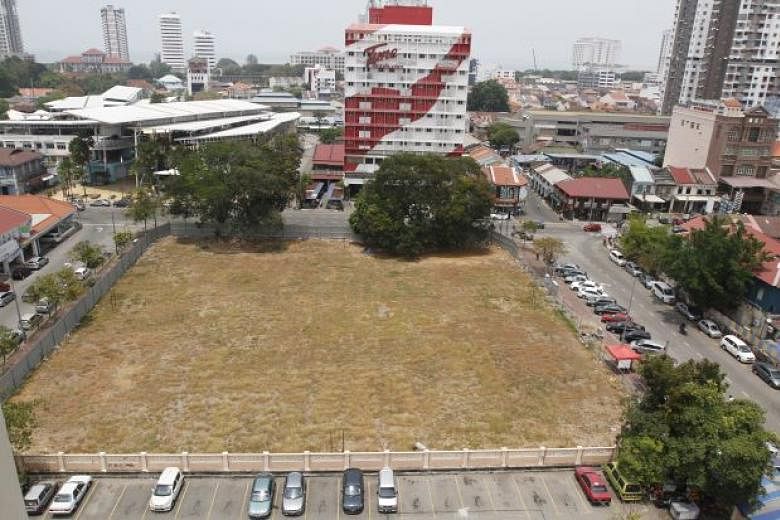The Taman Manggis land deal is fast becoming an I-accuse-you and you-accuse-me drama with no end in sight.
Joceline Tan
The Star/Asia News Network
Unfolding developments in the Taman Manggis (mangosteen garden) land deal could open a can of worms for the Penang administration.
Coffee and stale fried rice have been some of the items served in the ongoing saga of issues surrounding Penang Chief Minister Lim Guan Eng.
The Chief Minister's coffee invitations to his accuser on the bungalow issue has not been taken up and he has been photographed at least twice drinking coffee on his own in his Komtar office.
His would-be coffee date Datuk Shabudin Yahaya, the Umno MP for Tasik Gelugor, was the one who raised the undervalued bungalow issue in Parliament.
The stale fried rice, on the other hand, was aimed at allegations that Datuk Abdul Rahman Dahlan made about a plot of land in George Town known as Taman Manggis.
He also slammed the Urban Wellness, Housing and Local Government Minister as the "minister of rumours and slander".
Actually, the information and documents provided by Rahman on Taman Manggis were far from stale.
Taman Manggis had been controversial from the very start when the land, originally meant for affordable housing, was sold in 2010 to a company known as KLIDC (Kuala Lumpur International Dental Centre) for RM11.6 million (S$4 million) to develop a hotel and dental centre.
The undervalued price is only part of the controversy. The land has not been developed until today despite stipulated conditions.
In the meantime, leaked documents suggest that the state government had extended the leasehold on the land to 99 years and approved greater commercial content on the land use.
All these additional "perks" have jacked up the value of the land.
On Tuesday, Rahman produced sale and purchase documents to show that the Taman Manggis land had been resold at a handsome profit of RM 59 million (S$20.4 million) on Nov 11, 2015.
The land which was purchased for RM 11.6 million had been resold for RM 70.6 million. The company is still known as KLIDC but the shareholding had changed hands.
Lim insisted that KLIDC was still the owner and produced documents from the Commission of Companies Malaysia (CCM).
But the CCM company profile was last updated on Aug 27, 2015, several months before the land was resold. He also insisted that the land grant still states KLIDC as the landowner.
Taman Manggis is fast becoming an I-accuse-you and you-accuse-me drama with no end in sight.
Lim has denied any wrongdoing in connection with the sale of the Taman Manggis land.
What his political opponents want are answers from his administration because the sale of state land comes with strict conditions of what the new owner can or cannot do with it.
KLIDC's change of ownership at a hefty profit also raises a red flag.
"The state government is the trustee of public land. It has to explain what has happened and take corrective action. Moreover, Penang is known for its CAT (competency, accountability and transparency) policy," said a Penang lawyer.
The perks or what some see as special allowances accorded to KLIDC in terms of the enhanced land lease and favourable development land use also needs to be explained.
The Taman Manggis land deal has been described by some as a can of worms with some Internet websites linking it to certain well-connected businessmen and property developers in Penang.
The intense interest also has to do with the fact that Datuk Tang Yong Chew, the central figure in KLIDC, happens to be a business partner of Phang Li Koon in two other companies.
Phang is the lady who sold the Jalan Pinhorn bungalow to Lim for RM 2.8 million.
Lim's administration has declassified documents to rebut claims that the land was meant for affordable housing. The documents showed the Barisan Nasional government had proposed mixed development comprising government quarters and shop lots.
Lim's accusers said the land was sold via a form of negotiated tender known as request for proposal but he insisted it was through open tender.
His administration, in turn, accused Perda (Penang Regional Development Authority) of also selling state land at below market value in Seberang Perai.
Lim's administration is under tremendous pressure. It is evident that those around him are stumped by the well-researched nature of the attacks.
But they are standing by him even if they are unable to defend him in an adequate way.
The Chinese vernacular media like Sin Chew Daily have devoted one full page, sometimes two pages, of reports daily on the bungalow and Taman Manggis issues.
"Property, land and business - these are issues that our Chinese readers are interested in. When mixed with politics, it becomes even more interesting," said a senior journalist from Sin Chew Daily.
It has been smooth-sailing for Lim since coming to power in Penang but troubled waters lie ahead.

